Home Remedies For Bad Breath: 20 Quick, Effective Solutions
Say 'no' to embarrassing bad breath with some tried-and-tested remedies.

Image: shutterstock
Bad breath is an issue that is often treated as the elephant in the room where everybody feels awkward about it, but nobody wants to be the first to raise the subject. Halitosis, as bad breath is medically referred to, can be humiliating and cause a person to retreat and feel self-conscious. As you learn how to get rid of bad breath easily and effectively, you will be able to prevent such awkward situations in the future.
It is a popular misconception that bad breath begins and ends in the mouth. Instead, different problems in the digestive tract, stomach, gums, tonsils, tongue, nose, and even some systemic diseases might cause it.
Many people stay silent and put off seeing a doctor, and many more are unsure which doctor to visit. Others keep foul breath at bay with a basic brushing and flossing practice.
According to a survey, more than 80% of American adults have had at least one cavity by the age of 34, and one-quarter of adults aged 20 to 64 have untreated cavities. As per the 2025 data, 45,703 new cancer cases of the pharynx and oral cavity were diagnosed in the United States accounting for about 10,835 deaths, making it highly important to focus on planned dental care and oral hygiene.
If you have a bad case of bad breath and seek home remedies for it, you are at the right place. This article discusses several basic ways to deal with foul breath.
Let us first look at the reasons for foul breath before moving on to the solutions. Keep scrolling!
In This Article
What Causes Bad Breath?
Halitosis, or bad breath, when not caused by any underlying physical condition, is best tackled by eliminating the trigger from your lifestyle. Here are some common triggers of bad breath:
- Improper brushing
- Dry mouth
- Gum disease
- Teeth cavities
- Foods such as onion and garlic
- Food debris in the teeth and tongue
- A low carb diet
- Alcohol
- Tobacco and cigarettes
- Gastroesophageal Reflux Disease (Acid reflux)
- Diabetes
- Lung infection
- Certain medications, such as anti-allergic medicines and tricyclic antidepressants

While understanding the causes of bad breath is helpful, accurate diagnosis is key to determining the best course of action for treatment. Scroll down to know more.
Key Takeaways
- Acid reflux, cavities, and gum diseases can cause bad breath.
- Green tea can help kill the odor-causing bacteria.
- Maintain the pH balance in your mouth by consuming citrus fruits.
- Rinsing your mouth with a mouthwash after every meal to tackle bad breath.
Diagnosis Of Bad Breath
Halitosis, or bad breath, can be diagnosed in several ways to determine its root cause. One popular method is the smell test, in which a dentist evaluates the odor by taking a sample straight from the mouth or through a specialized tool. A dentist can assist in correctly identifying oral health conditions that may be causing bad breath, such as gum disease, cavities, or infections. Sometimes, a medical evaluation may be required to rule out systemic diseases like lung infections, diabetes, or digestive disorders in cases where the root cause is unrelated to dental hygiene.
The chances of bad breath due to an underlying disease are very low. However, if none of the home remedies given below seem to work, it is wise to consult a doctor.
Let us now look at the different remedies that will help you bid goodbye to bad breath.

How To Get Rid Of Bad Breath (Halitosis)
- Apple Cider Vinegar
- Activated Charcoal
- Gum
- Coconut Oil
- Epsom Salt
- Eucalyptus Oil
- Fennel Seeds
- Ginger
- Green Tea
- Grapefruit Seed Extract
- Parsley
- Lemon Juice And Yogurt
- Baking Soda And Lemon Juice
- Salt Water
- Sesame Oil
- Tea Tree Oil
- Guava
- Cardamom
- Hydrogen Peroxide
- Cinnamon
Effective Home Remedies For Bad Breath
Here are some popular home remedies and their usage instructions to manage bad breath problems.
1. Apple Cider Vinegar
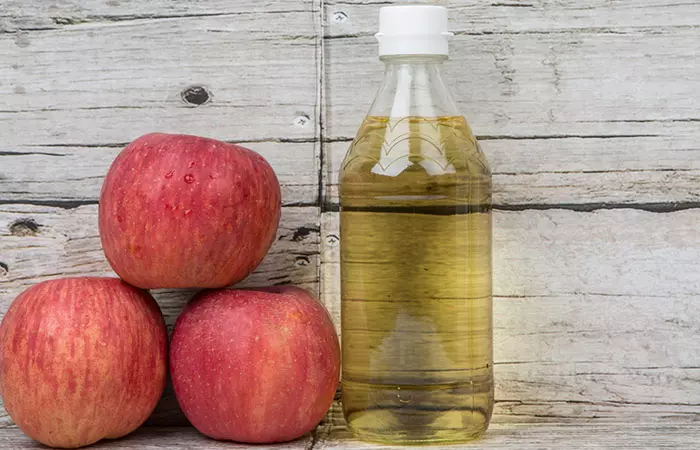
You Will Need
- 1-2 tablespoons apple cider vinegar
- A glass of cold water
What You Have To Do
- Make a solution with vinegar and water.
- Use this as a mouthwash. Gargle for 3-5 minutes.
- Rinse your mouth with plain water.
How Often You Should Do This
Do this in the morning and also before going to bed.
Why This Works
Apple cider vinegar has antibacterial properties that help greatly in reducing halitosis.
It restores the pH balance in the mouth (1).
2. Activated Charcoal
You Will Need
- 1/2 teaspoon of apple cider vinegar
- Toothbrush
What You Have To Do
- Brush your teeth with activated charcoal.
- Rinse your mouth thoroughly to remove all the charcoal.
How Often You Should Do This
Use activated charcoal 2-3 times a week until the bad breath problem is cured.
Why This Works
Activated charcoal absorbs the impurities in your mouth and kills harmful bacteria.
It is also good for whitening your teeth (2).
 Quick Tip
Quick Tip3. Gum
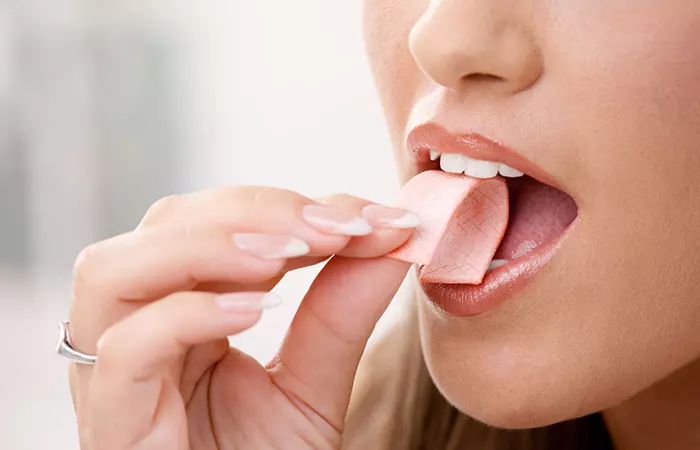
Continually chewing sugar-free gum can cure halitosis by promoting and maintaining a healthy flow of saliva in the mouth and throat. Most sugar-free gums also contain mouth freshening flavors like mint that give you odor-free breath for hours.
4. Coconut Oil
You Will Need
1 tablespoon virgin coconut oil
What You Have To Do
- Swish coconut oil around in your mouth for 5-10 minutes and then spit it out.
- Use lukewarm water to rinse your mouth after this.
How Often You Should Do This
Repeat this every day until the bad breath is gone.
Why This Works
Coconut oil swishing is a popular technique used to keep the mouth healthy and bacteria-free. This oil has anti-inflammatory and antimicrobial properties (3).
 Quick Tip
Quick Tip5. Epsom Salt
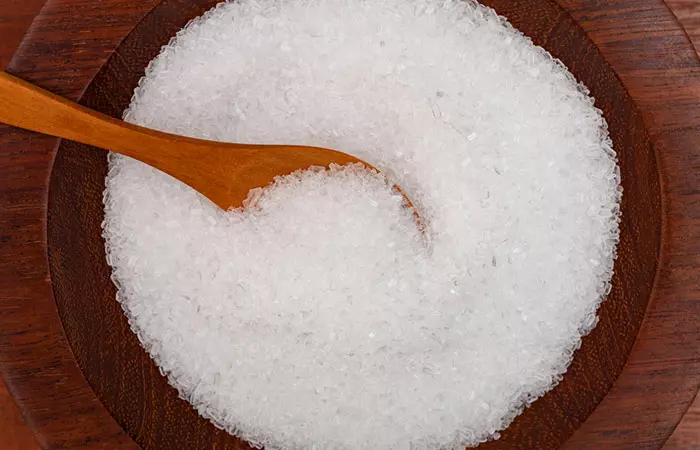
You Will Need
- 1 teaspoon Epsom salt
- A glass of lukewarm water
What You Have To Do
Mix the salt in the water and gargle with this.
How Often You Should Do This
Do this every day initially. After a while, do it every alternate day.
Why This Works
When it comes to toxin removal, Epsom salt is the most remarkable ingredient. It also has natural antibacterial properties that fight oral bacteria and eliminate odor in the mouth (4).
6. Eucalyptus Oil
You Will Need
- 1 cup water
- 2-3 drops eucalyptus oil
What You Have To Do
- Gargle with a mixture of the essential oil and water.
- Rinse your mouth with plain water.
How Often You Should Do This
Repeat this once every day until you get relief.
Why This Works
Eucalyptus oil exerts a bactericidal effect on different types of bacteria. It also has anti-inflammatory and analgesic properties that will alleviate any pain or swelling present in your mouth (5).
7. Fennel Seeds
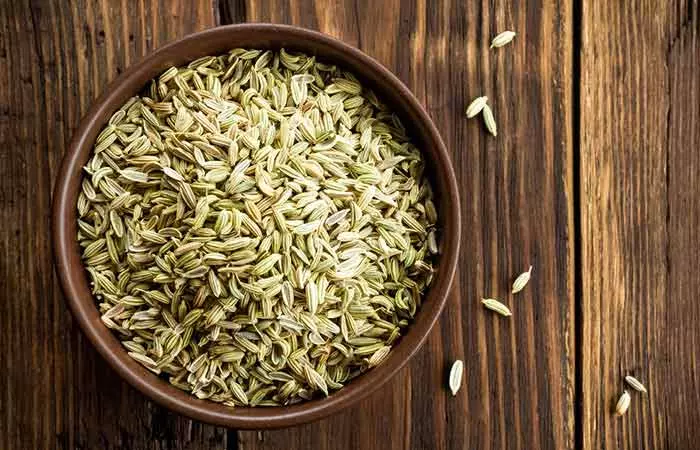
You Will Need
1 teaspoon fennel seeds
What You Have To Do
Chew on the fennel seeds and ingest them.
How Often You Should Do This
Use this remedy as and when required.
Why This Works
An intrinsic part of Indian culinary culture, fennel is effective in resolving halitosis issues very effectively. It freshens your breath and also takes care of any infections that may be causing bad breath (6).
8. Ginger
You Will Need
- 1 teaspoon ginger juice
- A glass of warm water
What You Have To Do
- Grate and squeeze the ginger root to extract fresh juice.
- Add this juice to warm water and rinse your mouth with it.
How Often You Should Do This
Do this after your meals initially, and then, once every few days to keep bad breath at bay.
Why This Works
The antimicrobial properties of ginger help to eliminate bad odor as well as different types of oral and throat infections (7).
9. Green Tea

You Will Need
- 1 green tea bag
- A cup of hot water
- Honey (to taste)
What You Have To Do
- Steep the tea bag for a few minutes and then remove it.
- Add honey to taste and sip on this tea.
How Often You Should Do This
Have 1-3 cups of green tea every day.
Why This Works
Having green tea early in the morning instead of tea or coffee with milk can take you a long way in your war against halitosis. The phytochemicals in green tea are naturally antibacterial and will wash away and eliminate the odor-causing bacteria (8).
10. Grapefruit Seed Extract
You Will Need
1-2 drops grapefruit seed extract
What You Have To Do
- Brush your teeth as usual.
- Put the grapefruit seed extract on your toothbrush and gently rub it on your teeth.
- Rinse your teeth with clean water.
How Often You Should Do This
Repeat this every day, and you will notice a difference in a week.
Why This Works
This citrus extract deodorizes the mouth and also eliminates any bacteria that may be growing in there (9).
11. Parsley
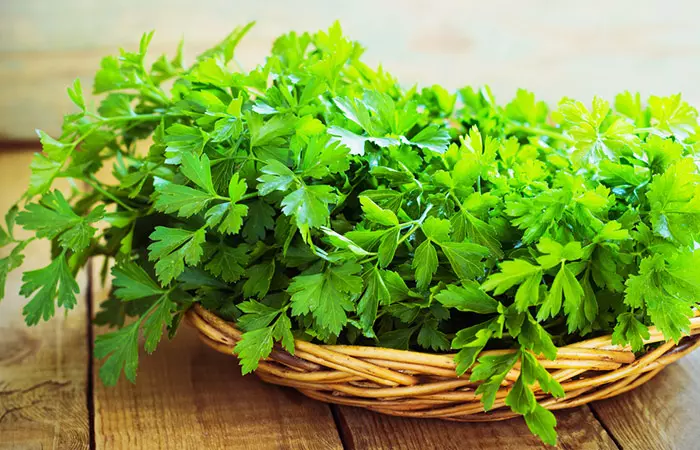
You Will Need
A few fresh parsley leaves
What You Have To Do
Chew the fresh leaves directly or add them as a garnish on your food.
How Often You Should Do This
Include parsley in your regular diet.
Why This Works
Parsley not only makes digestion effective and easy, but it is also a good home remedy for halitosis. The chlorophyll in parsley acts as an antibacterial and helps in eliminating the odor-causing bacteria from the mouth and the throat (10).
12. Lemon Juice And Yogurt
You Will Need
- 1 teaspoon lemon juice
- 1-2 tablespoons plain yogurt
What You Have To Do
- Mix the two ingredients and apply the mixture on your teeth.
- Leave it on for 5-7 minutes and then rinse your mouth.
How Often You Should Do This
Use this remedy as and when required.
Why This Works
Lemon juice is antibacterial in nature and will remove the odor-causing bacteria (11). The good bacteria present in yogurt will restore the balance in the natural flora of your oral cavity (12).
13. Baking Soda And Lemon Juice
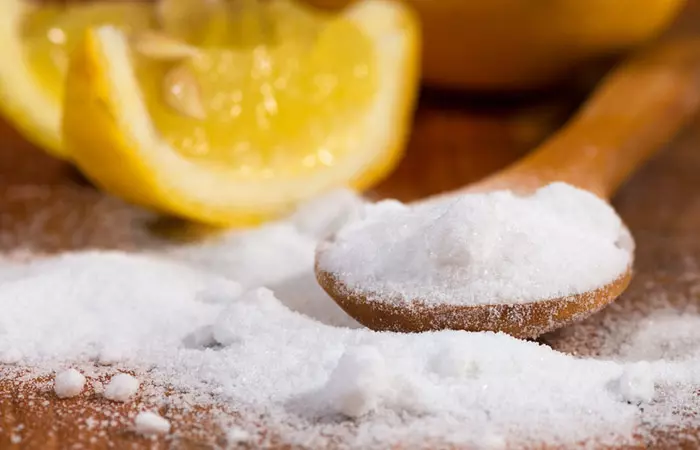
You Will Need
- 1 teaspoon baking soda
- 1/2 teaspoon lemon juice
What You Have To Do
- Mix the ingredients to get a coarse paste. Gently rub this paste on your teeth.
- Leave it on for a minute and then rinse your mouth with clean water.
How Often You Should Do This
Repeat this once a week.
Why This Works
Using lemon and baking soda for bad breath can be a convenient and effective solution. Baking soda balances the pH levels in the mouth and brings down the acidity as it is a natural antacid (13). Along with the antibacterial properties of lemon juice, this remedy makes for a potent combination to remove bad breath.
Caution
Do not use this remedy too often as excessive use of baking soda can damage the tooth enamel.
14. Salt Water
You Will Need
- 1 teaspoon table salt
- A glass of lukewarm water
What You Have To Do
Make some salt water with the ingredients and use it as a gargle.
How Often You Should Do This
Repeat this once or twice a day.
Why This Works
Salt water solution neutralizes the mouth’s pH and cleanses it as well (14). It is also antimicrobial in nature (15).
15. Sesame Oil
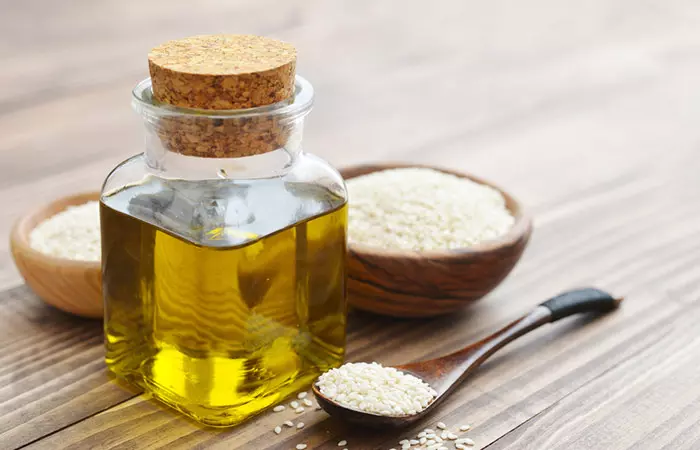
You Will Need
- 1 tablespoon sesame oil
- Lukewarm water
What You Have To Do
- Swish the oil around in your mouth for a few minutes.
- Spit it out and gargle with lukewarm water.
How Often You Should Do This
Do this every day in the morning.
Why This Works
Like coconut oil, sesame oil thoroughly cleanses your mouth and improves dental health. An added benefit of using this remedy is that sesame oil also whitens your teeth (16).
16. Tea Tree Oil
You Will Need
- 1-2 drops tea tree oil
- A glass of tepid water
What You Have To Do
- Add tea tree oil to the water.
- Gargle with this solution for 3-5 minutes.
You can also add a few drops of tea tree oil to your toothpaste before brushing.
How Often You Should Do This
Repeat this every day until the bad breath is gone.
Why This Works
Tea tree oil is a powerful antioxidant and antibacterial agent. It works against different types of bacteria and kills them (17).
17. Guava
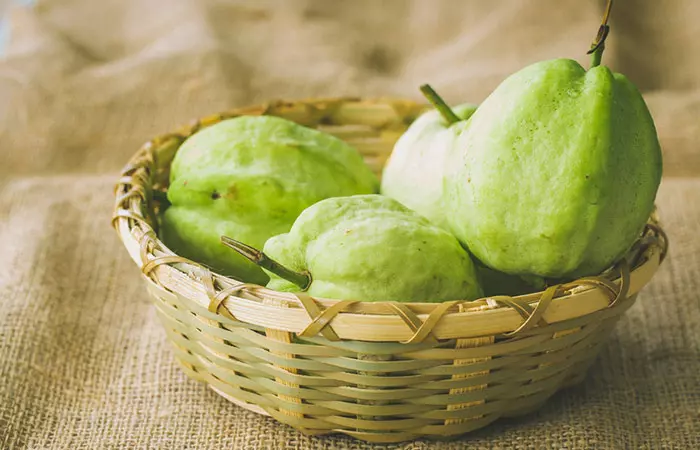
You Will Need
Unripe guava
What You Have To Do
Eat this fruit anytime during the day. You can also cut it into pieces and sprinkle some salt and black pepper powder on it for flavor.
How Often You Should Do This
Eat guavas a few times during the week.
Why This Works
Loaded with vitamin C, tannic acid, malic acid, and oxalate, guava is an apt remedy for bleeding and diseased gums, bad breath, and sensitive teeth. Chew on this wonder fruit to improve your overall oral health (18).
18. Cardamom
You Will Need
1 cardamom pod
What You Have To Do
- Chew on the pod as a whole or peel the pod and chew on the seeds present inside.
- You can ingest the chewed on pod.
How Often You Should Do This
Whenever you have had a meal with garlic and onions or any other food item that has a strong odor, pop a cardamom pod into your mouth after the meal.
Why This Works
Cardamom has been used since forever in India after meals. It acts as an aromatic freshener for your mouth and reduces bad breath by acting as a deodorizer. It masks the bad odor with its fragrance (19).
19. Hydrogen Peroxide
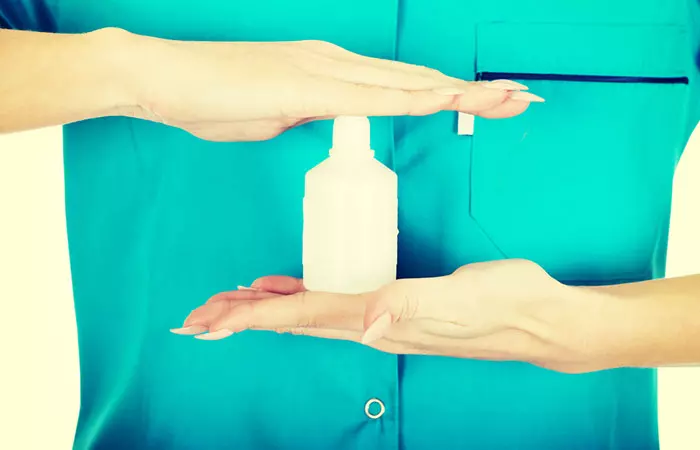
You Will Need
- 1 tablespoon 3% hydrogen peroxide solution
- 1/2 cup water
What You Have To Do
- Dilute the hydrogen peroxide in water and rinse your mouth with this solution.
- Gently brush your teeth, gums, and tongue to remove all residue.
- Rinse your mouth with plain water.
How Often You Should Do This
Do this in the mornings after brushing your teeth. Use it intermittently through the week for best results.
Why This Works
Hydrogen peroxide is a potent antimicrobial solution that can easily get rid of bad breath caused by bacteria (20).
Caution
Do not use this remedy repetitively every day as hydrogen peroxide can damage the teeth and gums on excessive exposure.
20. Cinnamon
You Will Need
- 1/2 tablespoon cinnamon powder
- 1-2 tablespoons honey (preferably Manuka honey)
- 2 lemons
- A cup of hot water
What You Have To Do
- Pour fresh juice squeezed out from the lemons in an airtight container.
- To this, add the cinnamon powder and honey.
- Pour the hot water over this, close the lid, and shake well to mix all the ingredients.
- Use 1-2 tablespoons of this blend to rinse your mouth after you brush your teeth.
- Rinse your mouth with plain water.
You can store the remaining cinnamon mouthwash in the airtight container for future use.
How Often You Should Do This
Repeat this every day for a few days.
Why This Works
Cinnamon and honey both possess antimicrobial properties that will disinfect and cleanse your mouth (21, 22). Lemon also contains acids that have a bactericidal effect on the oral flora while balancing the pH in the mouth.
It is very easy and convenient to treat bad breath at home with the simple home remedies listed in this article. All these remedies are easy to follow and work for most people. There are some that eliminate bad breath entirely, while others help you curb chronic halitosis. Pick a remedy that will work best for you. We have also listed some tips you can follow to keep your breath smelling fresh always.
Tips & Precautions To Control Bad Breath
(i) Brush, Brush, Brush
Three places to be properly brushed at least two times every day are the teeth, the tongue (on top and underneath), and the palate (there is a reason food is called palatable… that is because the palate plays an important part in chewing of food and can also harbor bad breath for the same reason). While brushing, take great care to clean the gums gently. Use a tongue scraper to properly clean your tongue.
Morris, a blogger and an independent researcher, shared that he tried brushing his tongue but it did not help. He states in one of his blog posts, “I only used to brush the front and middle areas of my tongue, but the trick is to go deeper and scrape out all the bacteria nesting in a safe, dark place around the base of your tongue (i)!”
(ii) Floss To Toss Bad Breath
Though millions of people choose not to floss or are unaware of its existence, it is still a very important part of a good oral care routine. Fine food particles stuck between the teeth and at the gum line can trigger moderate to severe bad breath. So, make sure you floss regularly and not just when you get food stuck between your teeth. Regular flossing can be just what you need to eliminate bad breath.
(iii) Eat And Rinse
It is not possible (or advisable) to brush after each meal of the day as doing so can wear down the enamel of the teeth. The next best and most feasible thing is to rinse your mouth properly whenever you eat anything. As soon as you eat, food debris gets deposited in your mouth. Bacteria begin to collect in the mouth to feed off this debris and give off that foul mouth odor. Proper rinsing washes away most of the food debris and reduces the feeding ground for bacteria.
(iv) Invest In A Mouthwash
A good pH-balanced and refreshing mouthwash is your ticket to halitosis-free days. After brushing and flossing, use a good mouthwash that will bring down the acidity in the mouth and act as an antibacterial to reduce halitosis effectively. Even if it is used to rinse the mouth after every meal, it works as well as water does in washing away food debris and odor-causing bacteria.
(v) Shun The Culinary Culprits
It is common knowledge that foods like garlic and onion cause bad breath, and it makes sense to avoid these foods in their raw form. Most Indian dishes are served with a side salad of onions and radishes, and you walk away from these meals with a strongly pungent odor in the mouth. If you must eat these foods, try including them in the recipe rather than eating them raw.
(vi) Non-alcohol Based Mouthwash
Not all mouthwashes will solve your halitosis problem. Look specifically for one that contains very low or no alcohol at all. The alcohol acts as a trigger for halitosis as it dries up the mouth. A mouth devoid of saliva always tends to develop bad breath.
(vii) Eat At Regular Intervals
Keeping the mouth underworked for long periods can promote oral dryness, which in turn promotes the build-up of odor-causing bacteria. Do not skip meals.
(viii) Citrus Blast
Did you ever experience relief from bad breath after eating an orange? That’s because the citric acid present in this tangy fruit promotes salivation. Saliva is your body’s way of maintaining a healthy pH balance, removing bacteria, and keeping the mouth hydrated. So, make some diet changes and add citrus fruits to keep halitosis at bay.
(ix) Take The Herbal Route
It is not for nothing that herbs are chewed in different forms around the globe. From parsley to mint, rosemary to spearmint, tarragon to basil – all these herbs can give you fresh breath instantly. They refresh the oral cavity, and when you swallow them, you give them the chance to kill harmful bacteria in the digestive tract.
(x) Reduce Complex Carbs
Complex carbohydrates promote bad breath as they give the bacteria in the mouth a lot more to break down, resulting in more odor. Try reducing your intake of white bread, refined sugar, white rice, and fine flour (maida). These foods not only cause bad breath but are also difficult for the body to break down.
(xi) Go For Regular Dental Check-ups
Schedule regular dental examinations to maintain oral health and take care of any underlying conditions that may be causing foul breath. Dentists can detect issues that may be causing the condition, such as infections, gum disease, or tooth decay. In addition to keeping your breath fresh, early identification and treatment of these conditions can help avoid more significant oral health issues.
There are some other foods that can make your breath smell bad. They are discussed in the next section.
What Foods Make Your Breath Smell Bad?
- Garlic and onions contain sulfur that can lead to bacterial growth in the mouth. This can result in halitosis or foul breath (23).
- Strong spices such as cardamom and cloves can also leave a strong odor in the mouth long after a meal.
- Some gastrointestinal issues can lead to a coating of the tongue. Consumption of milk, tea, or coffee on a coated tongue can worsen oral malodor (24), (25).
- Acidic foods (vinegar, citrus fruits) can aggravate foul smell in conditions such as GERD (25).
- High-sugar foods and carbonated beverages can increase plaque build-up, which may promote odor-causing bacteria (26).
Bad breath, or halitosis, is often triggered by conditions such as acid reflux, gum disease, diabetes, improper oral hygiene practices, lifestyle and dietary patterns or certain medications. And if you have also ever dealt with garlic and onion breath you would already know how embarrassing it can be. Therefore for the rescue are a few home remedies that can help you get rid of bad breath. Moreover, these remedies involve using basic and easily available ingredients. Apple cider vinegar, ginger, parsley, salt water, green tea, yogurt, fennel seeds, cardamom, and cinnamon are common kitchen staples that may help you tackle halitosis. Other effective ways include chewing gum, mints, or using hydrogen peroxide. Good oral hygiene, citrus fruits in the diet, and avoiding certain foods, alcohol, and smoking can help you keep bad breath at bay. It would be beneficial if you go for a regular dental check-up to avoid cavities and plaque buildup.
Infographic: 6 Most Effective Home Remedies For Bad Breath
Bad breath may occur due to dry mouth and underlying health issues. Regularly flossing your teeth, cleaning the tongue, and using mouthwash can improve oral hygiene and reduce bacteria buildup in the mouth, contributing to fresher breath. While persistent bad breath issues may require professional medical attention, some home remedies may help alleviate temporary or mild cases. Check out the infographic below for a curated list of the 6 most effective home remedies that you can try to combat bad breath.
Some thing wrong with infographic shortcode. please verify shortcode syntaxFrequently Asked Questions
Why does my breath stink even after brushing?
Factors such as dry mouth, ill-fitted dental devices, oral infections, gum diseases, cavities, and issues in the intestinal tract, kidneys, or liver may cause bad breath even after brushing your teeth.
What diseases can cause bad breath?
Kidney disease, liver disease, diabetes, and GERD are some diseases commonly responsible for bad breath.
Can you smell your own breath?
No. As your nose is connected to your mouth through an opening placed at the back of the mouth, it gets accustomed to the scent of your breath. You can do the lick and sniff test to determine how your breath smells. To do it, lick your wrist and let it dry for a minute before sniffing it. You’ll be able to identify your smell.
Learn how to get rid of bad breath with simple home remedies. Watch the video for some quick and easy tips and say goodbye to foul breath.
Personal Experience: Source
StyleCraze's articles are interwoven with authentic personal narratives that provide depth and resonance to our content. Below are the sources of the personal accounts referenced in this article.
i. 2 things that helped with my chronic bad breathhttps://medium.com/morris-health/things-that-helped-with-my-chronic-bad-breath-484e982d0e5c
References
Articles on StyleCraze are backed by verified information from peer-reviewed and academic research papers, reputed organizations, research institutions, and medical associations to ensure accuracy and relevance. Read our editorial policy to learn more.
- Halitosis: From diagnosis to management
https://www.ncbi.nlm.nih.gov/pmc/articles/PMC3633265/ - Halitosis and mouthwashes
https://www.ncbi.nlm.nih.gov/pmc/articles/PMC5531644/ - Factors associated with halitosis in white-collar employees in Shanghai China
https://www.ncbi.nlm.nih.gov/pmc/articles/PMC4871467/ - Halitosis
https://www.ncbi.nlm.nih.gov/books/NBK534859/ - The Impact of Carbohydrate Quality on Dental Plaque pH: Does the Glycemic Index of Starchy Foods Matter for Dental Health?
https://www.ncbi.nlm.nih.gov/pmc/articles/PMC8401118/
Read full bio of Dr. Thomas Connelly
Read full bio of Kushneet Kukreja
Read full bio of Arshiya Syeda
Read full bio of Dipti Sharma








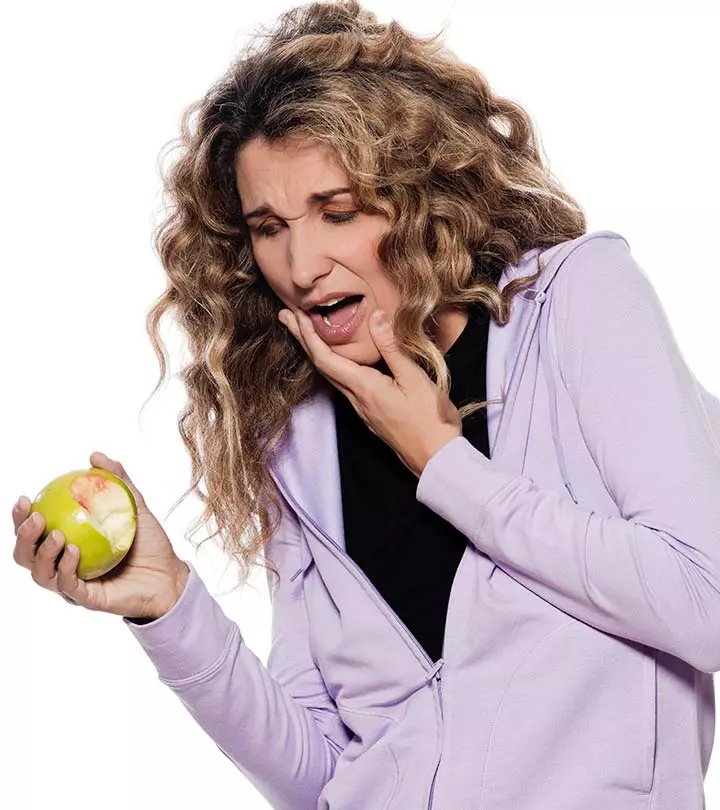















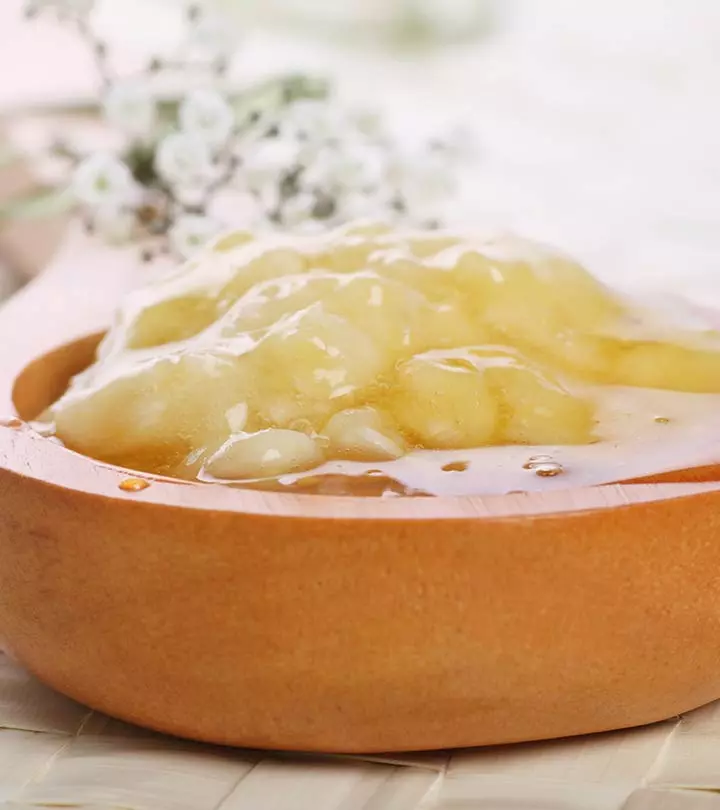

Community Experiences
Join the conversation and become a part of our empowering community! Share your stories, experiences, and insights to connect with other beauty, lifestyle, and health enthusiasts.